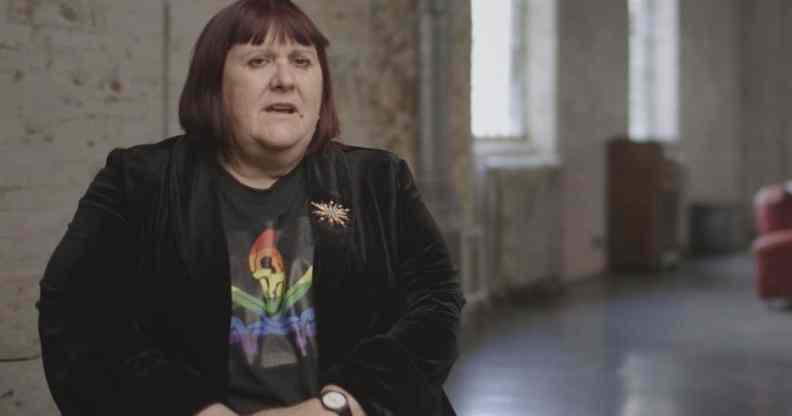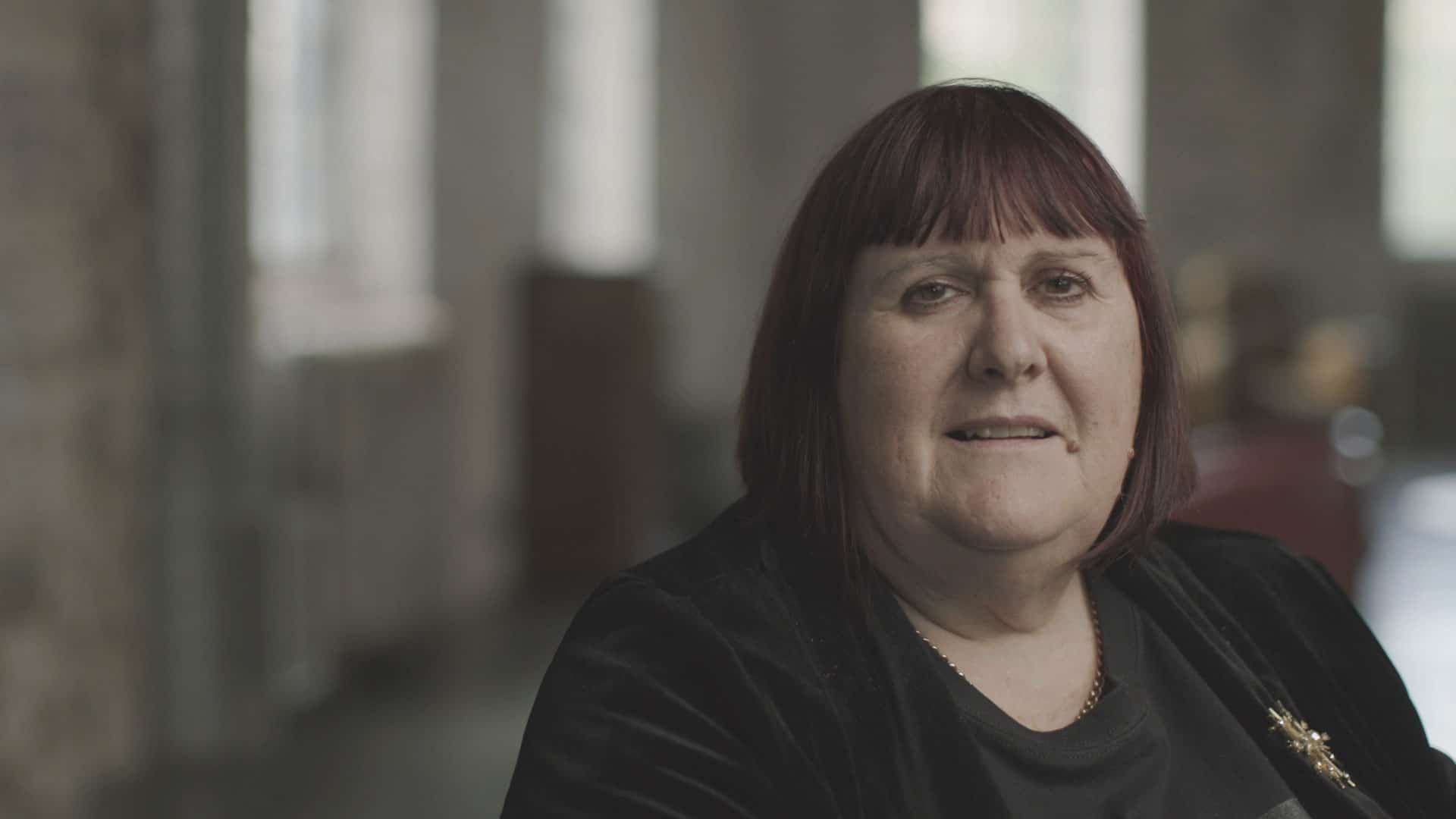Conspiracy theories and stigma: Lesbian icon Lisa Power recalls AIDS epidemic’s tragic coalface

Lisa Power in the three-part documentary series Positive. (Sky)
In the early 1980s, queer men started to die in alarming numbers. A mystery virus was doing the rounds, and nobody knew how it was spread or what its impact would be.
It was a frightening time for the queer people working at what was then called Gay Switchboard – a small, grassroots organisation that offered advice and information to queer people over the phone. Today, that charity is simply called Switchboard, and it offers support to the UK’s LGBT+ community.
Lisa Power was one of the only lesbians working for Switchboard when the mysterious virus that would later be identified as HIV emerged – and she remembers the fear, the confusion, and the feeling of helplessness that prevailed.
“You have to remember that at the start, we had no clue,” she tells PinkNews. “Gay men were starting to die – not huge numbers at the start, and nobody was sure why – and of course, I’m sure a number of people died who weren’t diagnosed in those early days. We were all just trying to get a grip on it, and for Switchboard, that meant a lot of information was coming over from the States. We were clinging on to what we were hearing from them.”
Lisa never wavered in her mission to stand up for queer people in the UK, and in the years that followed, she became a tireless lesbian activist who unwaveringly shone a harsh spotlight on HIV and AIDS. She was at the first ever ACT UP meeting in London, and she’s still working today to improve access to HIV testing for queer people who need it most in Cardiff, Wales.
Lisa’s remarkable story is just one of those shared in the new three-part Sky Documentary series Positive, which looks back on the way the AIDS epidemic came to be through first-person accounts of those who lived through it.
Conspiracy theories abounded about HIV and AIDS in the 1980s
Looking back on the early days of the crisis, Lisa tells PinkNews that it was a terrifying, fraught time for LGBT+ people. It was still deeply challenging to access information about the mystery virus that was doing the rounds, leaving those working at Switchboard in a difficult position. Eventually, clinicians in London and Manchester started taking an interest in the evolving situation.
“In the early days, I can remember some huge rows about what the cause was for this and what it was,” Lisa says. “All the conspiracy theories you heard about COVID, trust me, we had them about AIDS and then later on, even worse about AIDS treatment and HIV treatment,” Lisa says.
Still, Lisa and the other queer people working on the phones at Switchboard had to keep doing their job to the best of their ability, even when they didn’t always have the answers.
“There was a lot of fear on the phones,” Lisa reflects. “We caught up with this far earlier than the government, so we were already talking to people about it before leaflets went through people’s doors. For Switchboard, there was a big turnaround when those leaflets went through everybody’s doors because suddenly our phone number was available to every single household in the country. We didn’t just get a huge influx of people who were worried about AIDS, often completely unnecessarily, but also all those people who had aways wondered if they might be gay suddenly had a phone number to ring.”
Lisa and her fellow Switchboard workers were “inundated 24-hours a day” after the government sent out leaflets to the public about HIV. Even before that, the group decided that they should start talking to everyone who called about HIV – even if they had called for another reason.
“If a gay man or a man who thought he might be gay didn’t raise AIDS in a call, we would say at the end, ‘Have you heard about AIDS?’ We were raising it with them, and we were very proactive. We were actually trying to inform the community.”
In 1983, things kicked up a gear when the BBC aired Killer in the Village, a documentary that looked at the spread of the new mystery virus among gay men. Lisa doesn’t remember watching it, which probably means she was working on the phones at Switchboard when it aired, she says.
“Whenever something like that happened, we would make sure that all of the phone lines we had were working and we would also have other people who were there just to help the people who were on the phone lines – make them a cup of tea, calm them down if they had a horrid call. We knew the phones would go berserk after that programme, so a number of us would have been in there waiting to react to that.”
Lisa thinks the central issue facing activists at that time was that British society was terrified of talking about sex.
“That had always irritated me,” Lisa says. “Even when I was a teenager, I joined a local group in Croydon before I went to university, trying to do more to dispel myths about sex. I don’t know why, but I could never understand why people were so weird when it came to talking about a simple bodily function which could create great joy and great misery. I just thought that if only we got a grip on what was going on, find out what was causing this and actually concentrate on it, we could deal with it and get rid of it. I’m still doing that now. I’m a great interferer with things when I could see that something ought to be done.”
Stigma and discrimination must be challenged in order to end transmission
It’s safe to say that a lot has changed since the early days of the AIDS epidemic – today, antiretroviral treatment means people who have HIV can live long, healthy lives. When taken every day, that medication reduces the viral load in the bloodstream to an undetectable level, meaning HIV cannot be passed on even through condomless sex. PrEP is also available to those who are at a higher risk of contracting HIV – the daily pill prevents a person from contracting HIV when exposed to it.
All of those measures combined means that HIV is now a controllable condition – and activists have repeatedly argued that the epidemic could finally be brought to an end. The UK government has pledged to reduce new HIV cases by 80 per cent by 2025, and it has committed to ending transmission entirely by 2030. While much has changed, there are still barriers in the way of progress, Lisa says.
Most people have never heard that you can’t pass the virus on once you’re successfully on treatment.
“Sometimes I think everything’s changed, and then little things happen and I think nothing’s changed,” she says. “At the weekend, I was at a comic convention and we were collecting celebrity messages because it’s HIV Testing Week in Wales, and most of the actors were lovely and you can see brilliant messages from them online on Fast Track Cardiff’s social media. But then one guy just turned around and said, ‘What’s that got to do with me?’ He was really like, ‘Don’t talk to me about this.’
“Now, that’s less common than it was, but actually there are still huge swathes of ignorance about HIV, and down in Wales where I am, we’ve had no public health campaign, no information campaign about HIV for nearly 15 years. Most people have never heard that you can’t pass the virus on once you’re successfully on treatment. There are still a lot of people who don’t realise treatment will keep you alive to a ripe old age. They’ve certainly never heard about PrEP, despite the fact that Wales was ahead of England in getting it. Each generation has a new wave of ignorance until they’re educated.”
Stigma is also a major obstacle for activists working to bring about an end to HIV transmission in the UK, Lisa points out.
“You just have to look at the gay world to look at that internalised stigma within the scene, and the number of people who are still vile to people with HIV on dating apps,” Lisa says. “You’re actually better off having a relationship with someone who knows they’ve got HIV and is getting it treated than somebody who’s cavalier about their health and says, ‘Well I haven’t slept with that many people this year – I don’t really need to bother getting a test.'”
At the core of the problem is the regressive attitude to sex education that still prevails, Lisa says. She thinks the English government should take a leaf out of the Welsh government’s book and create “proper sex and relationships education in schools which doesn’t shy away from these issues”. Sex should be talked about as “something that’s part of a healthy, everyday life, and an ordinary life”, Lisa says.
We all need to challenge prejudice, Lisa explains – and the epidemic will only be brought to an end if there is a collective effort to do just that.
“People often think, ‘Well there’s not much I can do about it.’ If they’re not working with HIV and they’re not living with HIV, they say, ‘What’s it got to do with me?’ But actually everybody can understand what the current situation is and challenge ignorance where they see it.”
Positive will premiere on Sky Documentaries and streaming service NOW on World AIDS Day – 1 December – at 9pm.


